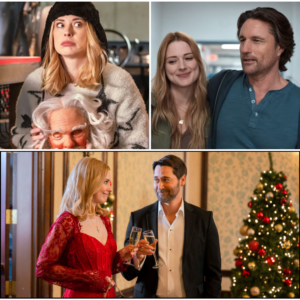In the humid embrace of Cebu City, Philippines, where the air hangs heavy with the scent of tropical storms and street-side adobo, Thomas Markle Sr. has carved out a quiet exile far from the glare of Hollywood lights and royal spotlights. At 81, the retired television lighting director moves with the deliberate caution of a man who has stared down two heart attacks and a near-fatal stroke, leaning on a cane that taps a rhythmic reminder of time’s relentless march. His 19th-floor apartment in a gleaming high-rise offers sweeping views of the Bohol Strait, a serene vista that belies the turmoil within. But on a fateful Tuesday night in early October 2025, that fragile peace shattered. A 6.9-magnitude earthquake ripped through the region, sending the building into a swaying frenzy for over 15 agonizing seconds. Walls groaned, neighbors screamed, and a ominous crack spiderwebbed across the hallway plaster. As power flickered out and the city plunged into blackout chaos, Markle—trapped 19 floors above ground—turned to his visitor with a question that cut deeper than any seismic fault line: “If we die tonight, do you think that Meghan will come to my funeral?”
The words, laced with wry humor and unspoken ache, hung in the dim glow of a flashlight, underscoring a rift that has festered for seven years. Meghan Markle, the Duchess of Sussex, once his pride and joy, has not spoken to her father since the eve of her 2018 wedding to Prince Harry. Now, in the aftermath of nature’s fury—which claimed at least 72 lives and injured hundreds more—Markle has broken his self-imposed silence with a bombshell plea. He wants to speak directly to King Charles III, the man who stepped in to walk Meghan partway down the aisle when illness sidelined him. Not for small talk or pleasantries, but for a raw, unfiltered reckoning on estrangement, betrayal, and the grandchildren he’s never met. What Markle intends to lay bare has sent shockwaves through tabloid circles and royal watchers alike: allegations of family sabotage, unanswered pleas for reconciliation, and a stark demand for photos of little Archie and Lilibet—children he imagines might bear the unmistakable “Markle nose.” It’s a conversation, he believes, that only two estranged fathers—one a commoner in tropical seclusion, the other a monarch in gilded palaces—could truly comprehend.
Markle’s story is one of quiet devotion turned to public heartbreak, a narrative as layered as the palm fronds rustling outside his window. Born in 1944 in New Hampshire, he built a steady career in Hollywood, lighting sets for everything from game shows to medical dramas. It was a world away from the Buckingham Palace fairy tale his daughter would one day inhabit. Meghan, his youngest child from a first marriage, arrived in 1981 amid the hum of Los Angeles life. Her mother, Doria Ragland, a social worker and yoga instructor, and Markle divorced amicably when Meghan was six, but he remained a pillar—co-parenting with grace, funding her education at prestigious schools like Immaculate Heart High, and cheering from the sidelines as she carved a path through Northwestern University and bit parts in Married… with Children. “There were good times,” Markle reflects now, his voice softening over a cup of PG Tips tea, the British import a nod to his adopted son-in-law’s heritage. “She was a good girl. I always loved her, and I always will. Nothing will ever change that.”
The fairy tale unraveled in 2016, when Meghan’s romance with Prince Harry blossomed into tabloid frenzy. Markle, then 72 and living in Rosarito, Mexico, became an unwitting star in the spectacle. He staged innocuous photos with a paparazzo—meant, he claims, to humanize him and quell invasive hounding—only for the images to ignite a firestorm. Leaked stories painted him as opportunistic, a grifter trading on his daughter’s fame. The fallout was swift: a heart attack days before the wedding, followed by a second, sidelining him from St. George’s Chapel. Enter King Charles, then Prince of Wales, who escorted Meghan for part of her procession, a gesture Markle still calls “deeply grateful” for. “I wish it could have been me,” he admits, eyes misting. “I was so proud of her that day.” But gratitude soured into silence. Meghan, in her 2021 Oprah interview, spoke of “grieving” the loss of her father, hinting at manipulations by half-siblings Samantha and Thomas Jr. that poisoned the well. Contact ceased, birthdays passed unanswered, and Markle’s pleas for a simple photo of his grandchildren fell on deaf ears.
Exile followed. In January 2025, Markle and son Tom Jr. relocated to the Philippines, drawn by affordable living—$500 monthly rent for a two-bedroom with infinity pool and gym—and the promise of anonymity. Cebu, with its blend of Spanish colonial charm and bustling markets, offered respite from Mexican media scrums. Yet health woes shadowed him: the 2022 stroke left him with a slight limp, and at 81, he confronts a family legacy where Markle men rarely crest 80. The earthquake amplified these fears, trapping him in a steel-and-glass cage as the ground rebelled. “I’m not getting any younger,” he told his guest, refusing the perilous stair descent. “When things like this happen, it makes me think about my own mortality, which I do a lot these days.” As aftershocks rattled dishes, conversation turned confessional. He spoke of stored mementos in a Los Angeles garage—childhood photos, report cards, a brass bed from Meghan’s girlhood—that he yearns to return. “I’d like to give Meg the chance to get her things,” he said. “But I don’t know how to get in touch with her.”
It is against this backdrop of vulnerability that Markle’s plea to Charles emerges, a bid for solidarity between two men bonded by absence. “I would like to speak to Charles,” he declared in a rare on-camera interview aired this week on a British network, his tone measured yet urgent. “Of all the people on the planet, he knows what it feels like to be estranged from a child and how tough it is.” The parallel is uncanny: Just as Harry and Meghan have aired grievances in Spare and Netflix specials—accusing the royals of racism, neglect, and institutional cruelty—Markle sees echoes in his own banishment. Charles, 76 and battling cancer, has seen his son only fleetingly since 2020, their last meeting a tense 45 minutes in February 2024 before Harry’s UK security woes escalated. Grandchildren Archie, now 6, and Lilibet, 4, remain spectral figures—video calls rumored but unconfirmed, Balmoral invitations withheld. Markle, who has never laid eyes on them, aches similarly. “I’d love to see my grandkids,” he confessed post-quake. “There are two grandfathers who would both love to see those kids. One happens to be the King of England. I wonder, do they have the Markle nose? When you are a grandparent, you think about things like that. I’d love a photograph.”
The shock lies not just in the request, but in the revelations Markle hints at unleashing in that hypothetical heart-to-heart—details he claims Meghan “never wanted out.” Sources close to the interview suggest a litany of betrayals: accusations that Meghan urged him to “cut off” contact with half-siblings Samantha and Thomas Jr., a demand he flatly refused, viewing it as divisive poison. “She asked me to sever ties with her half-siblings,” he alleged in a January 2025 TV spot, framing it as an early sign of the “hypocrisy” that defines her post-royal life. He paints Harry and Meghan as architects of dual exiles—ostracizing him while decrying the Firm’s cold shoulder—labeling their media empire a “betrayal” of the privacy they once championed. “Why have they treated not only me but the royal family and the king so badly?” he wonders aloud, echoing questions Charles might harbor. It’s a narrative of double standards: the couple’s $100 million Netflix deal built on tales of palace intrigue, while Markle, painted as the villain, rots in obscurity. “They’ve treated me so badly,” he laments, drawing parallels to Harry’s “unforgivable” jabs at Camilla in Spare.
The earthquake crystallized these wounds into something visceral. As the building shuddered, Markle chuckled through fear: “Will I get a better funeral because my son-in-law is fifth in line to the throne?” The quip masked deeper torment. “If I die and Meg and I are estranged, will she care? Will she show up?” He doesn’t seek pity—”It is what it is”—but closure. His son Tom Jr., ever the mediator, echoes the sentiment, noting the Philippines move was for “nicer, kinder” surroundings, away from feud-fueled headlines. Yet Markle’s olive branch extends beyond Charles; he wishes the king well in his health battles, a rare bridge across divides. “I have so many questions I’d like to ask Meghan and Harry,” he said ahead of his 80th birthday last July, unanswered as ever. “The main one being, why?”
In London, palace whispers suggest Charles, ever the diplomat, might entertain the outreach—not for drama, but empathy. Both men, after all, navigate thrones of solitude: one literal, the other emotional. Harry’s recent silence on his father’s condition, amid ongoing security pleas, mirrors Markle’s isolation. Meghan, thriving in Montecito with her lifestyle brand and podcast Confessions of a Female Founder—where she waxed poetic on fatherhood’s role last May—seems worlds away. Yet in that Cebu high-rise, as storm clouds parted to reveal dawn over the strait, Markle clung to hope. “I believed the photographer when he said posing for nice pictures would make my life easier,” he reflected on the 2018 scandal. “That was a terrible mistake, and I’ve been paying for it ever since.” Redemption, he implies, starts with a call—to a king who understands the sting of a child’s distance.
As rescue teams comb quake rubble and Cebu rebuilds, Markle’s words ripple outward, a seismic aftershock of their own. Will Charles pick up the phone? Will Meghan, in California’s sun-drenched hills, glimpse the photo he craves? In a world of fractured families—royal and otherwise—the plea underscores a universal truth: estrangement’s quake leaves cracks too deep for time alone to mend. For Thomas Markle, it’s not just a conversation with Charles he seeks, but a whisper across oceans to the daughter who once called him Dad. In that, the shock is simple, profound: love endures, even in silence.


